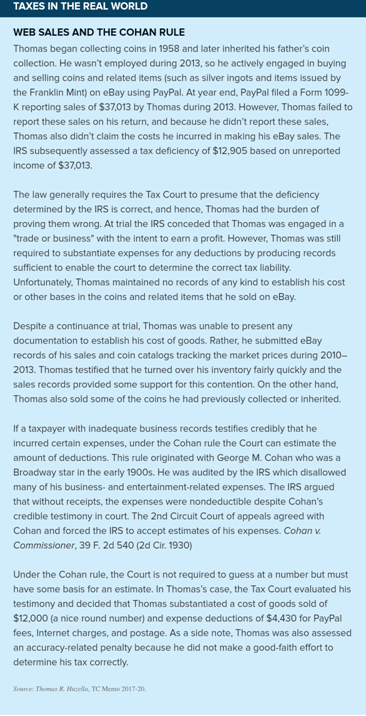1. If a taxpayer did not keep records of Cost of Goods Sold, what ways are there to estimate those costs?
2. What is the Cohan Rule?

TAXES IN THE REAL WORLD WEB SALES AND THE COHAN RULE Thomas began collecting coins in 1958 and later inherited his father's coin collection. He wasn't employed during 2013, so he actively engaged in buying and selling coins and related items (such as silver ingots and items issued by the Franklin Mint) on eBay using PayPal. At year end, PayPal filed a Form 1099- Kreporting sales of $37,013 by Thomas during 2013. However, Thomas failed to report these sales on his return, and because he didn't report these sales, Thomas also didn't claim the costs he incurred in making his eBay sales. The IRS subsequently assessed a tax deficiency of $12.905 based on unreported income of $37.013. The law generally requires the Tax Court to presume that the deficiency determined by the IRS is correct, and hence, Thomas had the burden of proving them wrong. At trial the IRS conceded that Thomas was engaged in a "trade or business with the intent to earn a profit. However, Thomas was still required to substantiate expenses for any deductions by producing records sufficient to enable the court to determine the correct tax liability Unfortunately, Thomas maintained no records of any kind to establish his cost or other bases in the coins and related items that he sold on eBay Despite a continuance at trial, Thomas was unable to present any documentation to establish his cost of goods. Rather, he submitted eBay records of his sales and coin catalogs tracking the market prices during 2010- 2013. Thomas testified that he turned over his inventory fairly quickly and the sales records provided some support for this contention. On the other hand, Thomas also sold some of the coins he had previously collected or inherited. If a taxpayer with inadequate business records testifies credibly that he incurred certain expenses, under the Cohan rule the Court can estimate the amount of deductions. This rule originated with George M. Cohan who was a Broadway star in the early 1900s. He was audited by the IRS which disallowed many of his business and entertainment-related expenses. The IRS argued that without receipts, the expenses were nondeductible despite Cohan's credible testimony in court. The 2nd Circuit Court of appeals agreed with Cohan and forced the IRS to accept estimates of his expenses. Cohan Commissioner, 39 F.2d 540 (2d Cir. 1930) Under the Cohan rule, the Court is not required to guess at a number but must have some basis for an estimate. In Thomas's case, the Tax Court evaluated his testimony and decided that Thomas substantiated a cost of goods sold of $12,000 (a nice round number) and expense deductions of $4,430 for PayPal fees, Internet charges, and postage. As a side note, Thomas was also assessed an accuracy-related penalty because he did not make a good-faith effort to determine his tax correctly. Sun The TCM 2017-20







